12+ SAMPLE Budget Estimate
-
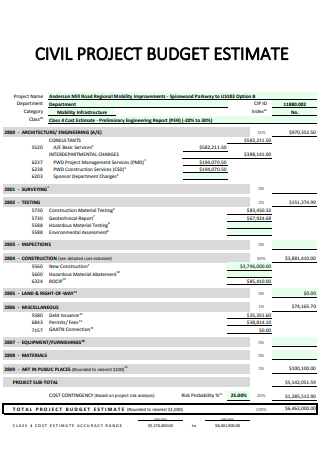
Civil Project Budget Estimate
download now -
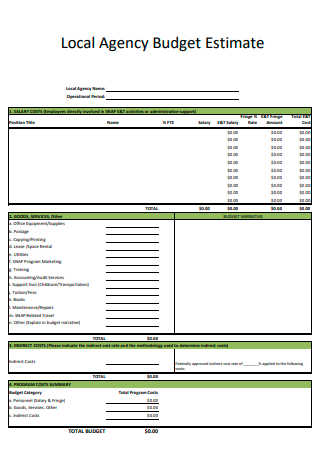
Local Agency Budget Estimate
download now -
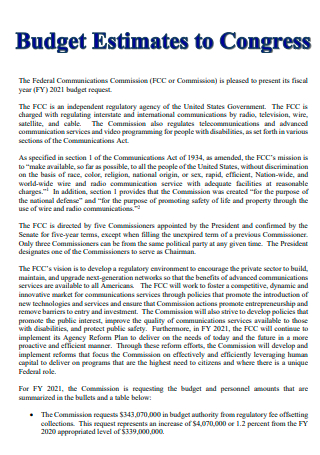
Budget Estimate to Congress
download now -
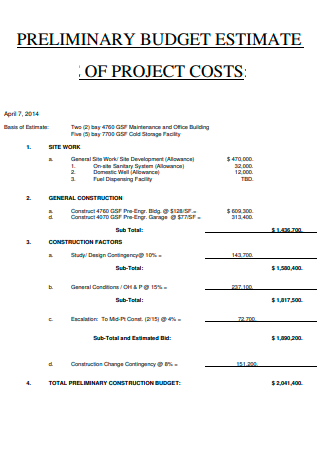
Preliminary Budget Estimate of Project Costs
download now -
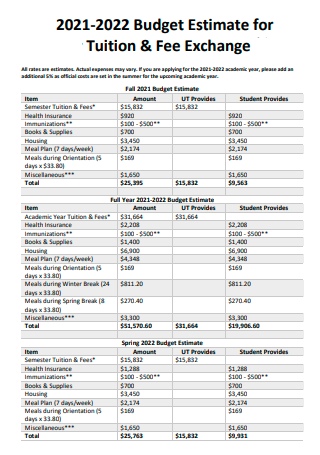
Budget Estimate For Tuition and Fee Exchange
download now -
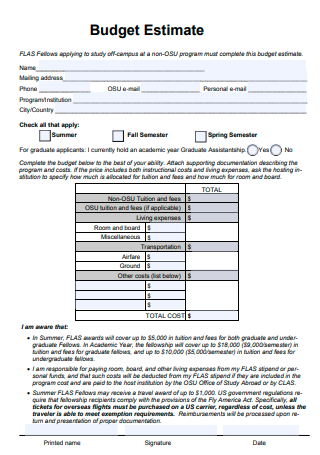
Basic Budget Estimate
download now -

Monthly Budget Estimate For Students
download now -
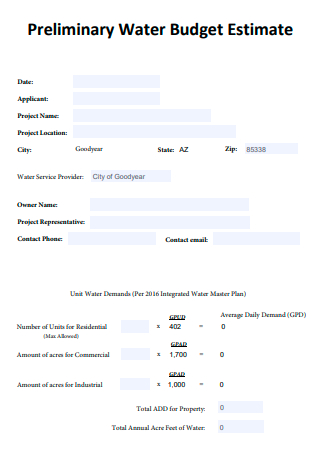
Preliminary Water Budget Estimate
download now -
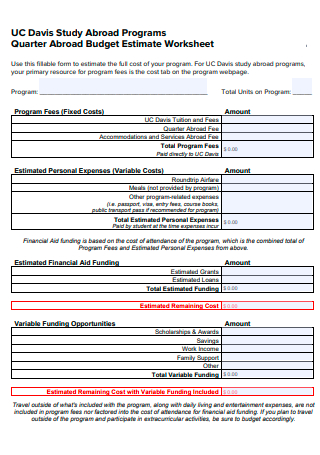
Budget Estimate Worksheet
download now -
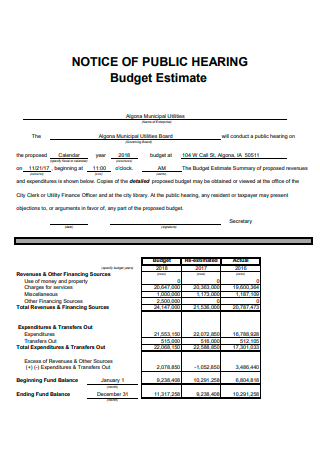
Budget Estimate Example
download now -
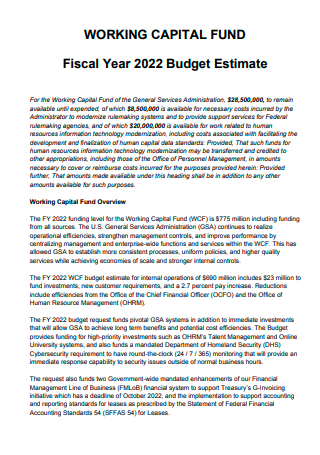
Working Capital Fund Budget Estimate
download now -
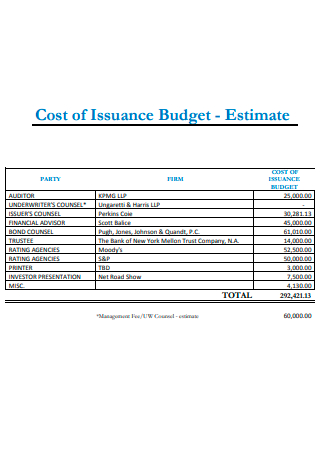
Printable Budget Estimate
download now -
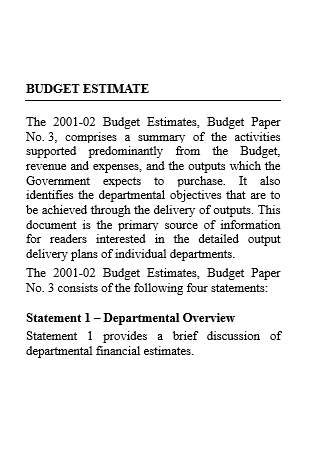
Budget Estimate in DOC
download now
FREE Budget Estimate s to Download
12+ SAMPLE Budget Estimate
What Is Budget Estimate?
What Are the Benefits of Budgeting?
What Is the Importance of Budget Estimation?
What Are the Most Common Types of Budget Estimates?
5 Techniques Used in Budget Estimation:
How to Create a Budget?
FAQs
What Is the Importance of Budget Estimation?
What Is an Advantage of Budget Estimating?
What Are the Main Reasons to Document Your Cost Estimate?
What Is Budget Estimate?
A budget is a financial plan created for a specified duration of time to achieve set goals. Budget estimation falls under the field of project management. The budget estimate approximates the time and resources needed to plan and complete a project and develop and implement a viable budget. You can classify budget estimates into:
Rough Estimates
These are the values a company generates in the early stages of project commencement to determine the approximate expected costs and whether it is well-equipped to undertake the venture.
Contract Estimates
Project developers also obtain these values in the initial stages of project initiation. They are, however, more accurate as one derives them from records of previous projects, similar to the prospective ones. Developers typically add these values to project proposals.
Definitive Estimates
These are the most accurate estimates as they are the closest ones to actual costs. They are, however, the most time-consuming ones as they require detailed information on all the project activities to come up with a figure.
A budget serves as an estimation of expenses and income over a certain period of time, usually monthly, quarterly or yearly. A budget allows a business owner to plan out expenses, reach business goals and anticipate any operational changes as needed to support the business. A budget helps a business understand their operating costs and can be used to track performance.
What Are the Benefits of Budgeting?
An effective budget should give the business owner the tools to track how the company is doing financially so they can plan for both short- and long-term expenses for everything from new hires to the cost of expanding operations. A budget can also give a company owner the ability to share their process and budget with a governing body, like a board of directors, and provide important status updates to current and potential investors. Here is what you can do with a budget:
Prepare for Emergencies
You never know what can come up in the course of doing business, so just as in personal life, it’s important to plan for the unexpected in business. A budget can help you set aside money in the event of an emergency so you don’t have to grab funds from some other part of business operations instead.
Attract Investors
Investors want to see that a company has their dollars accounted for. A well-formed budget shows organization and a commitment to the business that an owner without a budget may not showcase. When an investor sees budget sheets and can understand how much money the company anticipates bringing in and what its expenses are, he or she may then have more confidence in investing.
Set Sales Goals
Some expenses are associated with having a sales team or sales processes, and the budget can account for these. The budget can also include how much sales you expect the business to earn in a certain timeframe. With these items in place, you can set sales goals that align with the budget, adjusting as needed later on.
Meet Financial Goals
Every company should have financial goals that, if reached, means the company did well for the year and can continue operations as normal or even expand as needed. Without a budget in place, a business owner may not have an idea of how the company is doing and only realize after the year is over that the company isn’t making a profit. A budget can keep a business owner and all stakeholders on track to meet goals because there is a better awareness of where the money is coming in and being spent.
Pay Off Debt
Paying off debt is a major benefit of having a budget. A budget should include line items for each expense, with current debt being just one of them. As long as a business owner follows the budget and accounts for the monthly or quarterly debt payments, then they should be able to pay the debt off promptly.
Easily Prepare Taxes
Whether you do business taxes yourself or hire a professional, having a budget can make it easier to complete this process. For example, you can invest in tax preparation software or have someone on retainer who can file taxes for you. Your budget will make their process go faster too, potentially saving you money.
Make Large Financial Decisions
Most business owners are responsible for larger business decisions that will impact the money moving into and out of the company. With a budget, you will likely find it easier to make necessary decisions like how much you can afford to increase salaries, if bonuses can be available for team members, what benefits you can offer employees or if there is the opportunity to increase operations.
What Is the Importance of Budget Estimation?
Budget estimation is fundamental in planning any successful project. The following are some reasons why it is necessary:
- Budget estimation allows the organization to meet all its objectives for the project at hand without exceeding available funds. When drawing up a budget estimate, developers have to consider all the project tasks and allocate funds for each one of them. This helps the organization track its progress against these estimates.
- It allows the developers to prepare for any risks throughout the project. Risk estimates are part of the budget estimates and these values aid in developing a contingency fund for the project.
- It enables developers only to use the available capital and not exceed this amount in the course of the project. This prevents companies from terminating projects halfway or becoming bankrupt.
This is also important is some professions where budget estimation is required:
Construction Project Manager
These professionals develop, coordinate, budget for and oversee the entire construction process. They ensure deadlines are met and calculate labor and material costs.
Financial Advisor
This professional helps organizations create a financial plan, develop and review financial strategies, including budgets.
Accountant
These professionals help organizations operate efficiently by analyzing their financial records, reports, budgets and accounts.
Project Engineer
This professional develops, coordinates and monitors all aspects of an allocated project, including the budgets.
Most companies have several items they must pay consistently — daily, weekly, monthly, quarterly, yearly or otherwise — to maintain business operations. Budgets are important to ensure payment of these expenses and so the company can prevent any long-term debts. Without a budget, a business may experience any number of consequences, up to and including the dissolution of the company. Some of the items that a business may be responsible for paying include:
- Payroll: This can include everyone at the company, even the owner if they currently take a salary.
- Rent: Most companies lease an office, a warehouse, a brick-and-mortar location or other space where it conducts business and they must pay rent promptly.
- Utilities: Along with the lease of space comes utilities for electricity, water, internet and phone.
- Insurance: Insurance may include general liability insurance, property insurance and coverage for unemployment and workers’ compensation.
- Professional services: A company may have expenses to keep the company operational. These can include IT services, printer repair expenses, a tax professional and even a cleaning team.
- Advertising: It is common for a business to want to engage in some advertising to increase sales or brand awareness. Advertising costs money and may very well be a regular expense that a company is responsible for.
- Loans: A company may have loans they have to repay for opening the business, for gaining capital from investors and more.
With a proper budget in place, a business owner can anticipate expenses, plan for major increases in costs and even make changes to the company depending on operational needs. A business can also get goals, communicate priorities and create reports for potential investors, all by having a budget.
What Are the Most Common Types of Budget Estimates?
Consider these 5 most common types of budget estimates:
5 Techniques Used in Budget Estimation:
The following are the five methods commonly used in budget estimation, as well as their advantages and short-comings:
1. Analogous
Experts base this estimation technique on costs incurred on similar projects undertaken in the past done by the same company or from external sources. It is a quick and simple technique, but the information presented tends to be inaccurate. This is because despite having a few similarities, all projects are individually distinctive and there is a very small likelihood of the costs being the same.
2. Parametric
This technique uses known parameters to determine the cost of a specific project task. It employs measurable factors from previous similar projects to generate values. It is, for this reason, more accurate than the analogous estimation technique. Not only that, but it also may be hard to find data points for some tasks since not all factors are scalable.
3. Top-down
This is an approximate estimation technique that a project manager uses in the initial stages of a project after establishing a rough estimate of the project cost. This budget is then broken down and allocated to different project tasks to determine if the client’s budget is viable. This technique gives inaccurate values, but is quick.
4. Bottom-up
This technique involves breaking down the entire project into individual tasks, allocating funds to each activity, then summing up all the costs to come up with a total budget estimate. It is the most accurate method, but the most time-consuming one and leaves room for cost inflation.
5. 3-Point Estimation
This estimation technique involves finding the average of three values. The value is obtained by summing up the project’s cost estimates in the best-case scenario, worst-case scenario, the most probable cost and dividing this value by three. This method is beneficial as it puts potential risks into consideration, but is time-consuming.
How to Create a Budget?
The following are five simple steps to developing an efficient project budget:
Step 1: Divide the Project
Break down the project into individual tasks to understand its scope and determine everything that the team needs to do for its completion.
Step 2: Cost Estimate for Each Task
Establish and allocate an approximate value for each activity on the list. The budget developer should consider the cost of labor, materials, equipment and all other resources when estimating.
Step 3: Add Up the Estimates
Calculate the sum of the task estimates and come up with a total figure.
Step 4: Include Contingencies
Add an estimate of losses likely to be incurred within the project’s duration, to have a budget that caters to potential risks.
Step 5: Seek Approval
Obtain the total figures and present them to the board responsible for the project for concurrence and implementation.
FAQs
What Is the Importance of Budget Estimation?
Cost estimation helps you achieve what you say you’re going to achieve within the financial constraints you’re given by executives and stakeholders. As one of the defining features of successful progress, accurate project cost estimation must take a front seat when it comes to setting up a project’s parameters.
What Is an Advantage of Budget Estimating?
More accurate estimations result in smoother execution of the project. So, you are spared last-minute overheads, unforeseen expenditures, and blocked working capital. What this means is lesser project costs.
What Are the Main Reasons to Document Your Cost Estimate?
It also serves as a reference to support future estimates. Documenting the cost estimate makes available a written justification showing how it was developed and aiding in updating it as key assumptions change and more information becomes available.
A budget is one of the more important parts of having a business. When a company has their budgeting done right, they can plan, making sure they have the income coming in to offset expenses. A budget also makes it possible to plan for anticipated costs, like a large hire or the need to pay for a new piece of machinery to continue operations. Consider looking at your budget at the end of each month. That is the time to compare your actual numbers to what you anticipated and estimated when you first created the budget. You can see how your performance was and then revise as needed so you remain as accurate as possible.
Generally, there is no harm done if you overestimate expenses because doing so keeps you prepared for unanticipated expenses and does not allow them to ruin your budget. Overestimating may also give you money back into the budget that you can place in your emergency fund or use it to pay yourself back for another month where expenses may have been higher than expected.
